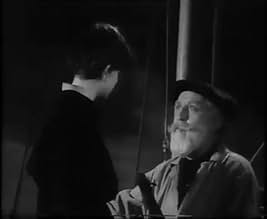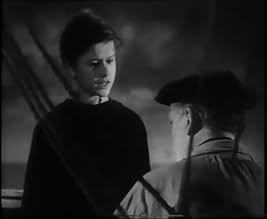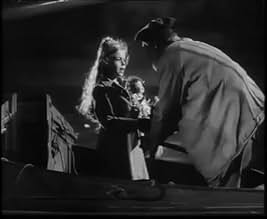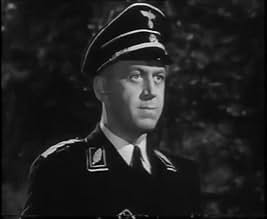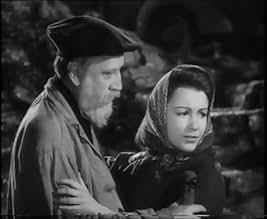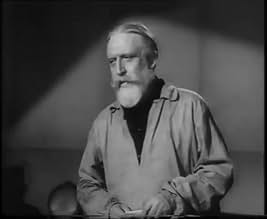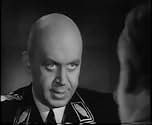Agrega una trama en tu idiomaWhile traveling in France during the Nazi invasion of 1940, an Englishman is entrusted with the care of a group of refugee children.While traveling in France during the Nazi invasion of 1940, an Englishman is entrusted with the care of a group of refugee children.While traveling in France during the Nazi invasion of 1940, an Englishman is entrusted with the care of a group of refugee children.
- Dirección
- Guionistas
- Elenco
- Nominado a 3 premios Óscar
- 4 premios ganados y 3 nominaciones en total
Rudolph Anders
- Lieutenant
- (as Robert O.Davis)
- Dirección
- Guionistas
- Todo el elenco y el equipo
- Producción, taquilla y más en IMDbPro
Opiniones destacadas
I love "The Pied Piper." Although born in New York City, Monty Woolley strikes just the right note as a British tourist in Europe who gets roped into shepherding several French children, most of whose parents have been killed in the World War II, to safety in England or America. Woolley was nominated for a Best Actor Academy Award for this film, and the film itself was nominated for Best Picture also. The supporting cast, including Anne Baxter, Roddy McDowell, and Otto Preminger, are likewise superb.
It boggles my mind that this award-nominated film is not available on video is any form. Why is 20th Century Fox ignoring this worthy film while so many others of lesser quality are released? Heck, I'd even take it in the Fox Cinema Archives series, if nothing else.
It boggles my mind that this award-nominated film is not available on video is any form. Why is 20th Century Fox ignoring this worthy film while so many others of lesser quality are released? Heck, I'd even take it in the Fox Cinema Archives series, if nothing else.
More than a few movie stars have learned their craft through the Yale School of Acting, including Meryl Streep, Paul Newman, and Sigourney Weaver. But not many professors teaching at the Ivy League university have become successful Hollywood actors. Monty Woolley was one of the most noteworthy dramatic instructors at Yale to make a go in movies. He earned the first of two Academy Awards Best Actor nominations for his role in August 1942's "The Pied Piper," as a Brit on a fishing vacation who finds himself leading a group of youngsters to freedom. The movie so impressed the Academy members they nominated it for Best Picture.
Nicknamed "The Beard," Woolley, a Manhattan native, taught English and Drama at Yale before directing Broadway plays beginning in 1929, followed by small roles in Hollywood starting in 1936. In his first film lead, 1942 "The Man Who Came to Dinner," Woolley re-enacted his stage role of the same name. "The Pied Piper" came next, causing him to admire his own acting talents, but was even more proud of his trademark beard. "Take the beards away from Santa Claus and Bluebeard and what do you have?" asked Woolley. "Nothing but a pair of middle-aged, overstuffed bores." In "The Pied Piper," Woolley, 64, plays Howard, an Englishman visiting France near the border of Switzerland when the Germans invade. Anxious to return home, he reluctantly takes his hosts' two children, Ronnie (Roddy McDowall) and Sheila (Peggy Ann Garner) to their relatives in England. On his way via train, Howard and company run into a number of obstacles while collecting other children along the way. One child includes the Jewish niece of Nazi officer Major Diessen (Otto Preminger), who wants Howard, who's his prisoner, to take her out of France. The Nunnally Johnson-written script adapted from Nevil Shute's 1942 novel of the same name emphasizes British patriotism as well as a critique on Nazi cruelty. The negative criticism of the Nazis in the movie would never have been permitted by the Hays Office censors before Pearl Harbor, but six months after the Japanese attack the honest portrayal of the German government was allowed.
Woolley had many fans, with an equal amount of critics who didn't particularly appreciate his brand of acting. Critic Erik Beck harped on his on-screen demeanor, claiming, "His acting seems to consist of standing around, blustering, and generally acting irritated. Wooley isn't a bad actor, but he's just bluster." Film reviewer Lura Grieve countered, "I have a soft spot for Monty Woolley, who was so good in films." His role as the guardian for the kids won him the Best Actor award from the National Board of Review.
"The Pied Piper" was the first film to star Otto Preminger, 37. The Austria-Hungary born director moved to the United States with his family at the outbreak of World War One. His first passion was the stage, both acting and directing. Handling four pictures in the 1930s, he increased his directing in the mid-1940s by producing a number of classics, including 1944 "Laura" and 1959 "Anatomy of a Murder." His performance as Major Diessen in "The Pied Piper" opened the eyes of the studios, pigeonholing him in a number roles playing German WW2 officers, including Colonel von Scherback in 1953's "Stalag 17." Besides the Academy Awards nominations for Best Picture and Woolley's Best Actor, "The Pied Piper" earned Edward Cronjager his third of seven Best Cinematographer (Black-and-White) nominations.
Nicknamed "The Beard," Woolley, a Manhattan native, taught English and Drama at Yale before directing Broadway plays beginning in 1929, followed by small roles in Hollywood starting in 1936. In his first film lead, 1942 "The Man Who Came to Dinner," Woolley re-enacted his stage role of the same name. "The Pied Piper" came next, causing him to admire his own acting talents, but was even more proud of his trademark beard. "Take the beards away from Santa Claus and Bluebeard and what do you have?" asked Woolley. "Nothing but a pair of middle-aged, overstuffed bores." In "The Pied Piper," Woolley, 64, plays Howard, an Englishman visiting France near the border of Switzerland when the Germans invade. Anxious to return home, he reluctantly takes his hosts' two children, Ronnie (Roddy McDowall) and Sheila (Peggy Ann Garner) to their relatives in England. On his way via train, Howard and company run into a number of obstacles while collecting other children along the way. One child includes the Jewish niece of Nazi officer Major Diessen (Otto Preminger), who wants Howard, who's his prisoner, to take her out of France. The Nunnally Johnson-written script adapted from Nevil Shute's 1942 novel of the same name emphasizes British patriotism as well as a critique on Nazi cruelty. The negative criticism of the Nazis in the movie would never have been permitted by the Hays Office censors before Pearl Harbor, but six months after the Japanese attack the honest portrayal of the German government was allowed.
Woolley had many fans, with an equal amount of critics who didn't particularly appreciate his brand of acting. Critic Erik Beck harped on his on-screen demeanor, claiming, "His acting seems to consist of standing around, blustering, and generally acting irritated. Wooley isn't a bad actor, but he's just bluster." Film reviewer Lura Grieve countered, "I have a soft spot for Monty Woolley, who was so good in films." His role as the guardian for the kids won him the Best Actor award from the National Board of Review.
"The Pied Piper" was the first film to star Otto Preminger, 37. The Austria-Hungary born director moved to the United States with his family at the outbreak of World War One. His first passion was the stage, both acting and directing. Handling four pictures in the 1930s, he increased his directing in the mid-1940s by producing a number of classics, including 1944 "Laura" and 1959 "Anatomy of a Murder." His performance as Major Diessen in "The Pied Piper" opened the eyes of the studios, pigeonholing him in a number roles playing German WW2 officers, including Colonel von Scherback in 1953's "Stalag 17." Besides the Academy Awards nominations for Best Picture and Woolley's Best Actor, "The Pied Piper" earned Edward Cronjager his third of seven Best Cinematographer (Black-and-White) nominations.
Monty Woolley is in France, fly fishing, when the radio announces the English evacuation of Dunkirk. Woolley had come to forget; his son, a flier in the RAF, is dead, and his attempts to serve in some capacity have been turned down. So here he is, occupying himself. But the other guest, an Englishwoman, at the inn he is staying at has to go elsewhere. She entrusts Woolley with her two children to get them back to England safely. They start off, but Germans slow them down. Somehow, they pick up other children to get to safety, and Ann Baxter, and even Dalio. But when they make it to the Channel, they are captured by Otto Preminger playing one of his Nasty Nazis, who is convinced that Woolley is an English spy using the children as a cover.
Is this a serious movie, or a fable? Or is there necessarily a difference between the two? Wooley gives a performance that goes from guarded and grumpy to open as he comes to realize his service is to take care of the children he has, largely unwittingly, been charged with. When Preminger prods him on what he means to do with this gaggle of children, he expounds on his decision to send them to connections in America. But had he thought this out earlier, or has it just occurred to him? Is this a well conceived idea, or just more English muddling through? I like to believe the latter, but would it make any difference to this tale of decency under threat?
With Roddy McDowall, J. Carrol Naish, Jill Esmond, and Peggy Ann Garner.
Is this a serious movie, or a fable? Or is there necessarily a difference between the two? Wooley gives a performance that goes from guarded and grumpy to open as he comes to realize his service is to take care of the children he has, largely unwittingly, been charged with. When Preminger prods him on what he means to do with this gaggle of children, he expounds on his decision to send them to connections in America. But had he thought this out earlier, or has it just occurred to him? Is this a well conceived idea, or just more English muddling through? I like to believe the latter, but would it make any difference to this tale of decency under threat?
With Roddy McDowall, J. Carrol Naish, Jill Esmond, and Peggy Ann Garner.
I read the novel twice many years ago and found it perhaps Nevil Shute's best story, and he wrote many, all outstanding. Still I am tempted to hint at the possibility that the film excels the book, much because of Monty Woolley's rendering of the grumpy old Englishman sick of everything who finds himself stranded in France by the war after Dunkirk and has to accept helping two children to England although he hates children. His long difficult odyssey through war-harried France to somehow reach England with constantly more orphaned children on his hands turns him into another and slightly different man, and the realism depicting this is what makes the film so impressing still today after 70 years for its more than just convincing character. It was made before any of the turning points of the war in 1942 after Pearl Harbour and the fall of Singapore while the Germans were still pounding Moscow and besieging Leningrad, in brief, when the war was at its grimmest. Nevil Shute's story is about humanity in the depth of the despair of this world crisis, which the film admirably conveys, underlining the realism. Monty Woolley, however, is finally matched by Otto Preminger as the German officer, who represents the final conversion to humanity and couldn't make it better as a perfectly brutal and revolting officer who finally has to fall to his own humanity. It's one of the greatest stories told from the second world war, and the film honours it. Strange though that this very important and wonderful film should be so hard to find on internet. A remake was made for TV in 1989 with Peter O'Toole which also pays credit to the story, such a story can only be told well, but that film can't be found at all.
I have to admit it...I like Monty Woolley. You can count on the old curmudgeon to make any movie worth watching, Woolley is definitely one of the classic screen's best scene stealers!
In "The Pied Piper" Woolley plays an Englishman who is visiting France when the Germans invade in 1940. Realizing his place is back home, he packs up and begins his trek to England...but with the unwelcome addition of 2 French children (Roddy McDowall and Peggy Ann Garner) whose parents fear for their safety in Nazi-occupied France.
But what should be a relatively easy journey turns into a nightmare, as French civilization crumbles around them. Every time Woolley and his companions face a crisis, another desperate child joins the group, until he finds himself the leader of quite a menagerie.
Others in the cast include Anne Baxter as "Nicole," who helps Wooley outsmart the German occupiers and Otto Preminger as "Major Diesson," the ranking Nazi who also finds he has use for Woolley and his children.
"The Pied Piper" doesn't shy away from the grim realities of war and the suffering it imposes on everyone, both young and old. One can only imagine the impact this film had on moviegoers in 1942. The film was released just 7 months after Pearl Harbor.
In "The Pied Piper" Woolley plays an Englishman who is visiting France when the Germans invade in 1940. Realizing his place is back home, he packs up and begins his trek to England...but with the unwelcome addition of 2 French children (Roddy McDowall and Peggy Ann Garner) whose parents fear for their safety in Nazi-occupied France.
But what should be a relatively easy journey turns into a nightmare, as French civilization crumbles around them. Every time Woolley and his companions face a crisis, another desperate child joins the group, until he finds himself the leader of quite a menagerie.
Others in the cast include Anne Baxter as "Nicole," who helps Wooley outsmart the German occupiers and Otto Preminger as "Major Diesson," the ranking Nazi who also finds he has use for Woolley and his children.
"The Pied Piper" doesn't shy away from the grim realities of war and the suffering it imposes on everyone, both young and old. One can only imagine the impact this film had on moviegoers in 1942. The film was released just 7 months after Pearl Harbor.
¿Sabías que…?
- TriviaThe original fairy tale was based on the disappearance of the children of the Dutch - not German - village of Hamelin. Although at the time they were thought to have vanished magically, it is now believed that the children left to join one of the Children's Crusades and were taken into slavery.
- ErroresThe seven-year-old German girl near the very end of the movie (at c.1:18 and at c.1:21) speaks German with a distinct American accent.
- Citas
Howard: I have two small children!
Railroad official: At your age, monsieur, that is undoubtedly magnificent!
- ConexionesFeatured in Minute Movie Masterpieces (1989)
Selecciones populares
Inicia sesión para calificar y agrega a la lista de videos para obtener recomendaciones personalizadas
- How long is The Pied Piper?Con tecnología de Alexa
Detalles
- Tiempo de ejecución
- 1h 27min(87 min)
- Color
- Relación de aspecto
- 1.37 : 1
Contribuir a esta página
Sugiere una edición o agrega el contenido que falta

